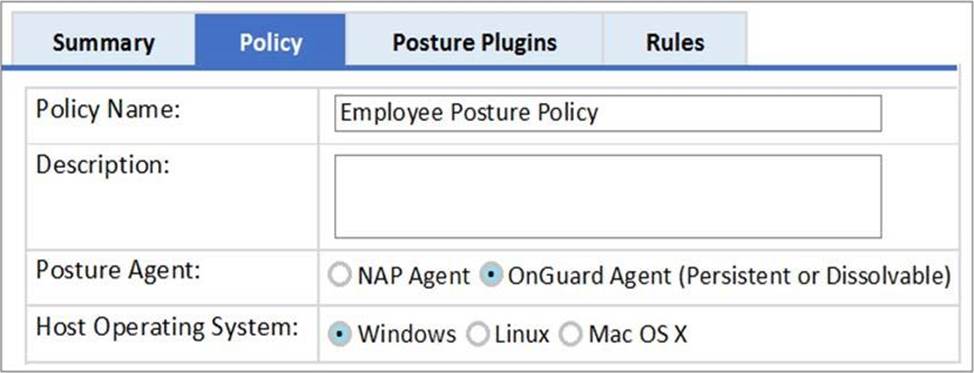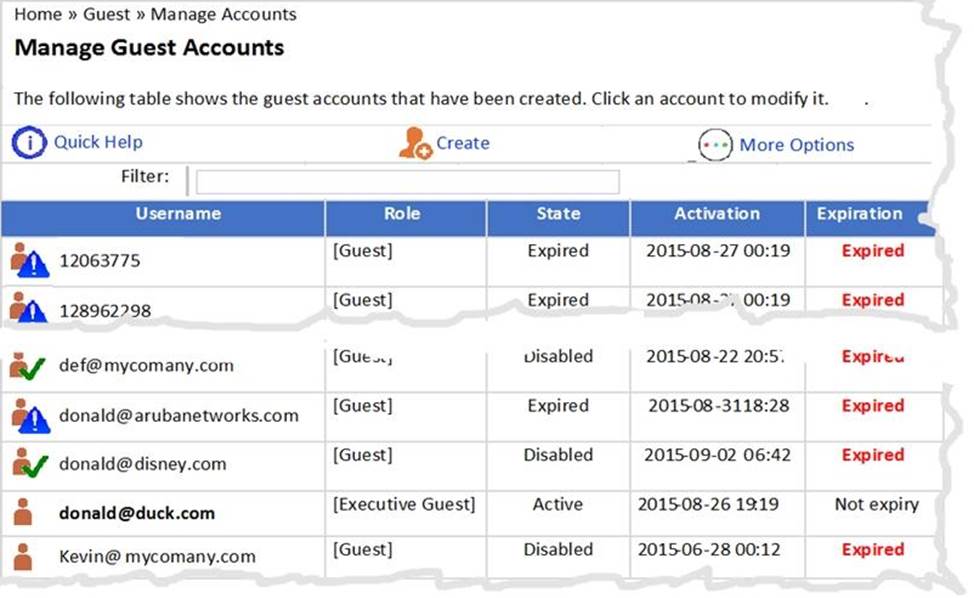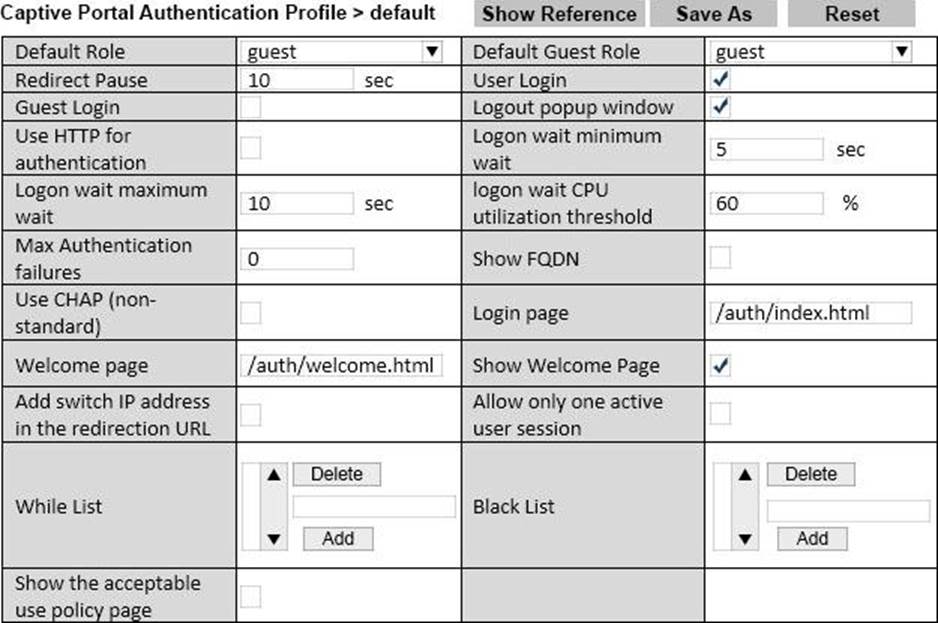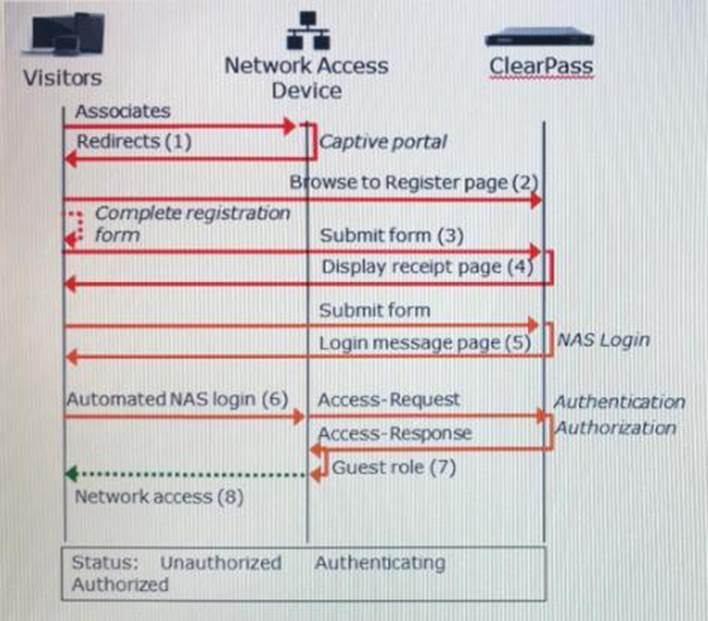HP HPE6-A68 Aruba Certified ClearPass Professional (ACCP) V6.7 Online Training
HP HPE6-A68 Online Training
The questions for HPE6-A68 were last updated at Dec 18,2025.
- Exam Code: HPE6-A68
- Exam Name: Aruba Certified ClearPass Professional (ACCP) V6.7
- Certification Provider: HP
- Latest update: Dec 18,2025
Refer to the exhibit.

Based on the Posture Policy configuration shown, above, which statement is true?
- A . This Posture Policy can only be applied to an 802.1x wired service not 802.1x wireless.
- B . This Posture Policy checks the health status of devices running Windows, Linux and Mac OS X.
- C . This Posture Policy can use either the persistent or dissolvable Onguard agent to obtain the statement of health.
- D . This Posture Policy checks for presence of a firewall application in Windows devices.
- E . This Posture Policy checks with a Windows NPS server for posture tokens.
Refer to the exhibit.

Which types of records will the report shown display?
- A . all RADIUS authentications from the 10.8.10.100 NAD to ClearPass
- B . all failed RADIUS authentications through ClearPass
- C . only Windows devices that have authenticated through the 10.8.10.100 NAD
- D . all successful RADIUS authentications through ClearPass
- E . all successful RADIUS authentications from the 10.8.10.100 NAD to ClearPass
Refer to the exhibit.

An administrator logs in to the Guest module in ClearPass and ‘Manage Accounts’ displays as shown.
When a user with username [email protected] attempts to access the Web Login page, what will be the outcome?
- A . The user will be able to log in and authenticate successfully but will then be immediate disconnected.
- B . The user will be able to log in for the next 4.9. days, but then will no longer be able to log in.
- C . The user will not be able to log in and authenticate.
- D . The user will be able to log in and authenticate successfully, but will then get a quarantine role.
- E . The user will not be able to access the Web Login page.
What is the purpose of the Audit Viewer in the Monitoring section of ClearPass Policy Manager?
- A . to audit client authentications
- B . to display changes made to the ClearPass configuration
- C . to display the entire configuration of the ClearPass Policy Manager
- D . to audit the network for PCI compliance
- E . to display system events like high CPU usage.
A university wants to deploy ClearPass with the Guest module. The university has two types that need to use web login authentication. The first type of users are students whose accounts are in an Active Directory server. The second type of users are friends of students who need to self-register to access the network.
How should the service be set up in the Policy Manager for this network?
- A . Guest User Repository and Active Directory server both as authentication sources
- B . Active Directory server as the authentication source, and Guest User Repository as the authorization source
- C . Guest User Repository as the authentication source, and Guest User Repository and Active Directory server as authorization sources
- D . Either the Guest User Repository or Active Directory server should be the single authentication source
- E . Guest User Repository as the authentication source and the Active Directory server as the authorization source
ClearPass and a wired switch are configured for 802.1x authentication with RADIUS CoA (RFC 3576) on UDP port 3799. This port has been blocked by a firewall between the wired switch and ClearPass.
What will be the outcome of this state?
- A . RADIUS Authentications will fail because the wired switch will not be able to reach the ClearPass server.
- B . During RADIUS Authentication, certificate exchange between the wired switch and ClearPass will fail.
- C . RADIUS Authentications will timeout because the wired switch will not be able to reach the ClearPass server.
- D . RADIUS Authentication will succeed, but Post-Authentication Disconnect-Requests from ClearPass to the wired switch will not be delivered.
- E . RADIUS Authentication will succeed, but RADIUS Access-Accept messages from ClearPass to the wired switch for Change of Role will not be delivered.
A customer wants to implement Virtual IP redundancy, such that in case of a ClearPass server outage, 802.1x authentications will not be interrupted. The administrator has enabled a single Virtual IP address on two ClearPass servers.
Which statements accurately describe next steps? (Select two.)
- A . The NAD should be configured with the primary node IP address for RADIUS authentication on the 802.1x network.
- B . A new Virtual IP address should be created for each NAD.
- C . Both the primary and secondary nodes will respond to authentication requests sent to the Virtual IP address when the primary node is active.
- D . The primary node will respond to authentication requests sent to the Virtual IP address when the primary node is active.
- E . The NAD should be configured with the Virtual IP address for RADIUS authentications on the 802.1x network.
What is a benefit of ClearPass Onguard?
- A . It enables organizations to run advanced endpoint posture assessments.
- B . It allows a receptionist in a hotel to create accounts for guest users.
- C . It allows employees to self-provision their personal devices on the corporate network.
- D . It offers an easy way for users to self-configure their devices to support 802.1X authentication on wired and wireless networks.
- E . It allows employees to create temporary accounts for Wi-Fi access.
Refer to the exhibit.

Based on the information shown, which field in the Captive Portal Authentication profile should be changed so that guest users are redirected to a page on ClearPass when they connect to the Guest SSID?
- A . both Login and Welcome Page
- B . Default Role
- C . Welcome Page
- D . Default Guest Role
- E . Login Page
Refer to the exhibit.

Based on the guest Self-Registration with Sponsor Approval workflow shown, at which stage does the sponsor approve the user’s request?
- A . After the RADIUS Access-Request
- B . After the NAS login, but before the RADIUS Access-Request
- C . Before the user can submit the registration form
- D . After the RADIUS Access-Response
- E . After the receipt page is displayed, before the NAS login
Latest HPE6-A68 Dumps Valid Version with 116 Q&As
Latest And Valid Q&A | Instant Download | Once Fail, Full Refund

